Embattled Chinese developer Shimao seeks offshore investors’ approval to restructure US$11.7 billion debt
- The ‘proposal represents a reasonable and realistic solution for the compromise of the offshore debt’, firm says in filing with the Hong Kong exchange
- Shimao’s creditors have been presented with four options, according to the filing

The Shanghai-based firm is seeking approval from offshore creditors for a restructuring plan, according to a filing made to the Hong Kong stock exchange late on Monday, as part of its latest efforts to avoid liquidation.
Shimao’s creditors have been presented with four options, including repayment through short-term notes, long-term notes, zero-coupon mandatory convertible bonds and a combination of different securities, according to the filing.
But the aggregate principal amount offered through short-term notes or loans due in six years to the offshore creditors will not exceed US$3 billion under the scheme, while the amount allocated to long-term notes or loans due in seven to nine years will not exceed US$4 billion, the company said.
“The company believes that the proposal represents a reasonable and realistic solution for the compromise of the offshore debt, having taken into account the expected conditions in the property market in China and the company’s cash flow position,” Shimao said.
